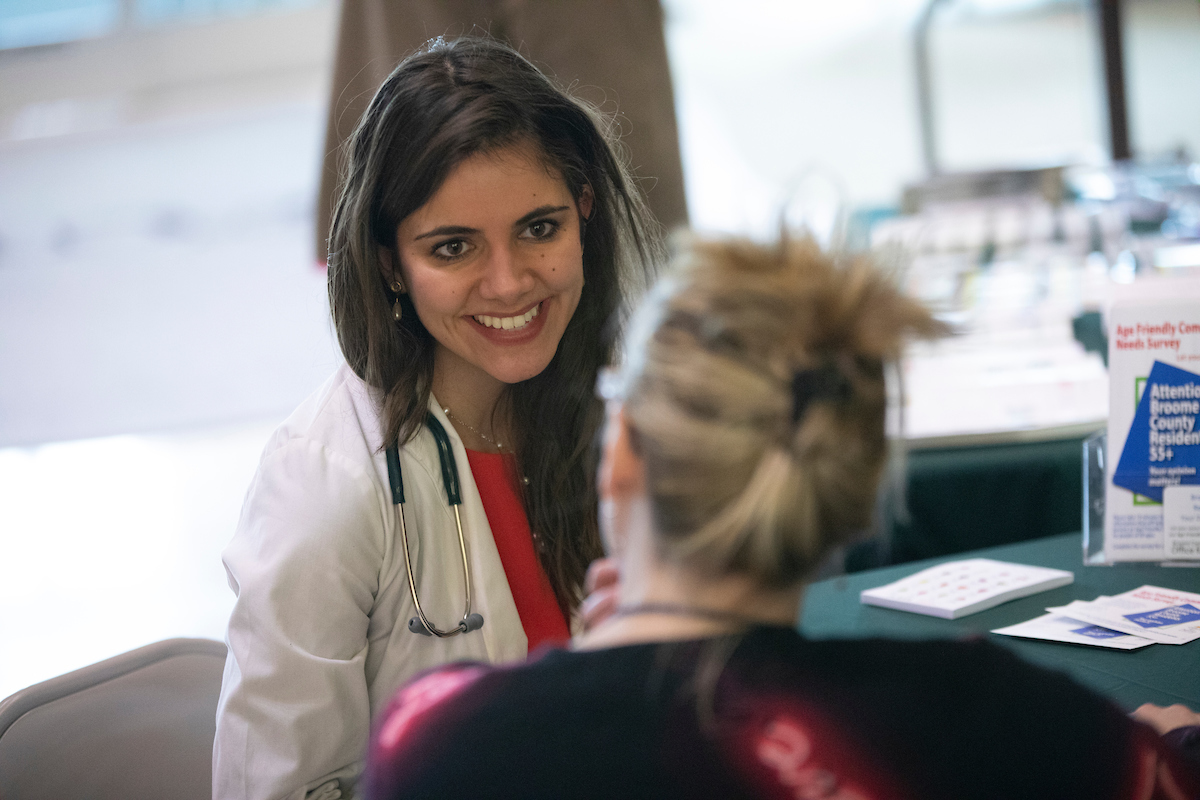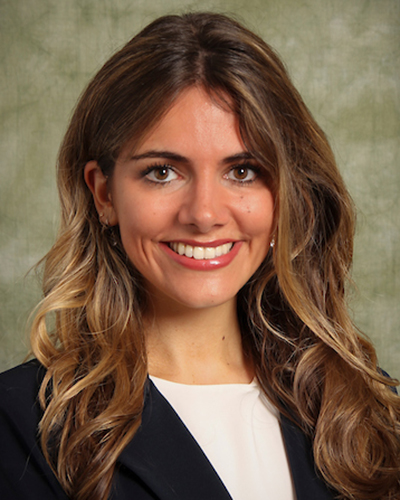Keri Mastro Dwyer: Pharmacy grad becomes the teacher

Keri Mastro Dwyer has realized her dream. She grew up in the Binghamton area, remains firmly embedded here with her family and she’s now teaching at Binghamton University’s School of Pharmacy and Pharmaceutical Sciences (SOPPS).
“It’s very exciting,” said Binghamton’s newest clinical assistant professor of pharmacy practice. “I’ve always dreamed of being able to fulfill a position in academia, as my experiences have fostered a growing passion for a career in academic pharmacy.”
After earning her bachelor’s degree in biological sciences from Binghamton University in 2016, Dwyer enrolled in the Doctor of Pharmacy program at SOPPS, graduating in its inaugural class in 2021. Next came a year-long PGY-1 residency at SUNY Upstate University Hospital in Syracuse, which she completed earlier this year.
Dwyer’s Binghamton education and residency experience have prepared her for her new role. “I’m grateful for the role models and mentors I’ve been fortunate to learn from and I hope to give back to the profession by providing support and inspiration to pharmacy scholars, as I have been fortunate enough to experience as a former student at Binghamton’s SOPPS.”
The opportunity came at just the right time for Dwyer, who has had a whirlwind year, completing her residency, getting married, buying a house and beginning her teaching career.
She honed her skills and gained further training across a wide variety of clinical experiences during her residency, and is now bringing that training to her teaching. “I was fortunate to work with a team of preceptors, pharmacists and five other co-residents at SUNY Upstate,” she said. “I really valued the experience and it helped contribute in a big way to where I am today. I was able to learn from a wide variety of pharmacists across a diverse set of clinical opportunities; it was great to train in a supportive environment and I’m thankful for that experience.”
At SOPPS, Dwyer has a diverse involvement across the curriculum. During the fall semester, she has assisted in an integrated pharmacotherapy course focused on gastrointestinal diseases, various skills lab courses, a professional development course, a residency elective course and a hematology/oncology/autoimmune diseases integrated pharmacotherapy course. In the coming spring, she will help in teaching with an introduction to integrated pharmacotherapy clinical sciences, as well as teach in the skills lab courses, assist in an infectious diseases elective and help with the delivery of an interprofessional education course, in addition to assisting in the sterile compounding/aseptic technique lab, which was an area of focus in one of her previous roles as a pharmacy intern locally. She gained further experience with these skills during her residency.
Throughout the PharmD program, Dwyer is involved from assisting with the delivery of some foundational, introductory content delivered to the first-year pharmacy students, to working with fourth-year students as they prepare to apply and interview for their next professional endeavors, and working with second-year and third-year students in between.
“I’m thankful to have the opportunity to be involved with teaching in multiple courses, and to gain experience interacting with all of the student cohorts across our program,” she said.
And though this is Dwyer’s first teaching position, she was able to obtain a teaching certificate through her residency at SUNY Upstate. “Not all residency programs offer a teaching certificate, but I knew it was something I truly valued,” she said. “I was able to obtain this valuable teaching experience, facilitated by St. John Fisher University’s Wegmans School of Pharmacy, where, along with other residents, we developed our teaching skills, delivered lectures and established interactive activities in the didactic environment, while also gained experience with facilitating experiential learning for pharmacy scholars in the clinical setting through supporting preceptor roles.
“These opportunities ultimately allowed me to pursue professional endeavors with a stronger background of experience, specifically as I prepared to fill the role of clinical assistant professor,” she said. “Additionally, at SUNY Upstate, I was able to gain a research micro-credential, which is also a very unique opportunity, specific to the residency program there. The training through obtainment of the research micro-credential went above and beyond in providing more of an emphasis on the research experience, from initial phases of the research process such as project identification, through preparing and submitting a manuscript for publication.”
The research micro-credential has also helped Dwyer prepare for the research and scholarship component of her faculty role at SOPPS, as well as to provide mentorship and guidance to students for their longitudinal research projects, she said.
Dwyer also has a clinical practice site at Lourdes Hospital/Ascension in Binghamton.
As a clinical assistant professor of adult medicine, she is based with providers to support patient care with a focus on general medicine and will precept students for the general medicine rotation experiences beginning in the spring. For now, she is rounding with physicians and collaborating with other pharmacists and providers to support interventions on the floor, while also preparing her precepting plans and working to evolve project ideas which would cater specifically to benefitting the practice site.
“With adult medicine, clinical management often involves a wide variety of disease states and I am passionate about contributing to interprofessional collaboration to provide clinical support to the healthcare team and achieve optimal patient care,” she said. “That can be anything from advocating for appropriate antimicrobial stewardship to ensuring a proper medication history process upon admission, through advocating for evidence-based, guideline-directed disease state management throughout inpatient therapy, and supporting the optimization of medication profiles upon discharge, just as a few examples! Appropriate transitions across the continuum of care are critical.
“It’s all about making sure that we are providing the best possible care we can to our patients and working in any way that we as pharmacists can support fellow providers in delivering high-quality care,” she added. “I’m looking forward to involving students as well and to supporting their learning in the clinical setting. There are a lot of impactful opportunities for interventions implemented by pharmacists and that excites me. I’m thankful to have had significant general medicine experiences throughout my residency training at SUNY Upstate and I’m eager to utilize what I have learned toward contributing to strengthen the scope of clinical pharmacy services in the local area surrounding SOPPS.”
Dwyer is excited to serve her hometown community and practice professionally in the area she calls home!

